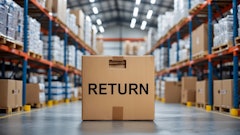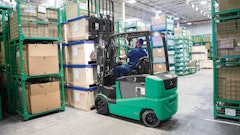March 18--Consumers are doing more of their shopping online, and the surge in e-commerce is contributing to several big-box retailers closing or downsizing their bricks-and-mortar stores nationwide -- and in this region.
Some retail analysts have been forecasting for years that a day of reckoning was coming when formerly expansion-hungry retailers that overbuilt in their search for profits and greater market share would have to close their stores in large numbers. One of those analysts predicted to McClatchy Newspapers this month that a "tsunami" of store closings could come this year.
Local experts are more measured in their predictions of the impact on the area -- but they agree the trend is real, and it's accelerating.
"There's an all-out assault on traditional retail," said Kendall Goodrich, chair of the marketing department at Wright State University. The assault is being led by Amazon, which is moving toward a same-day delivery guarantee on many items, and by other online-only retailers that do not have to endure the same costs such as rent and utilities that bricks-and-mortar retailers must pay, Goodrich said.
Serdar Durmusoglu, associate professor of marketing at the University of Dayton, said he believes e-commerce and bricks-and-mortar retail will find an equilibrium in the coming years, and he noted that despite the steady growth of e-commerce, sales at bricks-and-mortar stores dwarf online retail and will for the foreseeable future.
But the shift in consumer buying habits is accelerating: E-commerce sales totals had been increasing at an average pace of about 10 percent annually since 2001 -- and that pace jumped to 15 percent in 2012, boosted in part by the rise of the smartphone, which makes online shopping even easier. A study from Deloitte predicted last year that e-commerce will account for about 30 percent of all U.S. retail sales by 2025 -- up from about 7 percent now.
Here are just a few of the examples of the shift and its potential impact both inside and outside our region:
-- Earlier this month, the office-supply chain Staples announced it plans to close up to 225 of its 1,800 stores in North America by the end of 2015 -- and company officials made it clear a shift to online sales was a driving factor in the decision. Staples said they it was shifting its resources after recognizing more of its sales are coming from its e-commerce sites and less from its bricks-and-mortar stores. Meanwhile, Staples quintupled the number of items available for sale online from 100,000 to 500,000 in a just a one-year period through the end of 2013, company officials said.
-- Office Depot, which completed a corporate merger with OfficeMax in November, has been downsizing its stores' retail footprint for more than five years, and last week, company officials confirmed that its store at 2850 Centre Drive near the Mall at Fairfield Commons in Beavercreek will relocate later this year to a nearby storefront at 3340 Pentagon Blvd. "We had the opportunity to re-locate from the original location, which is around 25,000 square feet, to a 15,000-square-foot location nearby," a company spokeswoman said. "This made good business sense for us."
-- In a consumer electronics sector of the retail market that has been among the most affected by the shift to e-commerce, Radio Shack announced this month that it was closing up to 1,100 of its stores, but did not identify which ones. Best Buy's announcement in January that its same-store holiday sales declined sent its stock price plunging 29 percent in a single day, and some industry analysts are predicting another round of store closings to be a part of the company's cost-cutting measures in the near future.
-- When Kmart confirmed in January that it would close its 40-year-old downtown Xenia store in April, a company spokesman said the closing would "accelerate the transformation of our business model," and added, "These actions will better enable us to focus our investments on serving our customers and members through integrated retail -- at the store, online and in the home." Kmart also closed a store in Springfield in 2012.
-- Target, which has invested heavily into its online sales capabilities (which took a hit from its massive data security breach disclosed in January) announced earlier this year that it will close two stores in this region, in Trotwood and in Middletown.
-- Macy's, which has corporate offices in Cincinnati and New York City, announced in January that it would lay off about 2,500 employees and close five stores -- none in Ohio -- as part of a cost reduction plan and a shift in focus to online sales. Company officials said the layoffs will primarily affect employees at its retail stores --but also said they'll continue to hire additional employees and transfer some existing employees to its online-sales operations.
E-commerce will never completely replace traditional in-store retail, but it will affect retailer growth patterns even after the current round of store closings runs its course. That's the prediction of Cassidy Turley Commercial Real Estate Services -- a Washington D.C.-based company which operates a Dayton office and 59 others across the country.
WSU's Goodrich predicted a move toward large stores that combine warehouse and retail functions under one roof, similar to Ikea. Cassidy Turley foresees more examples of "Experiential Retail" in which shopping centers strive to turn the shopping experience into an entertainment experience as well.
UD's Durmusoglu said while some employees will lose their jobs in the shakeout of store closings, the overall competition among the retailers will have its benefits.
"The more competitive that retailers are, the better for customers," he said.
Companies both large and small that focus primarily on face-to-face sales in retail stores have advocated for federal legislation that would force online retailers to collect sales tax, a move they say would "level the playing field" with bricks-and-mortar stores.
A hearing was held earlier this month in the U.S. House of Representatives on legislation that would do just that, although the bill's future is uncertain, especially during a congressional election year. Buyers are supposed to keep track of and pay sales tax on Internet transactions, but the requirement is frequently ignored.
Copyright 2014 - Dayton Daily News, Ohio












![Pros To Know 2026 [color]](https://img.sdcexec.com/mindful/acbm/workspaces/default/uploads/2025/08/prostoknow-2026-color.mduFvhpgMk.png?ar=16%3A9&auto=format%2Ccompress&bg=fff&fill-color=fff&fit=fill&h=135&q=70&w=240)


